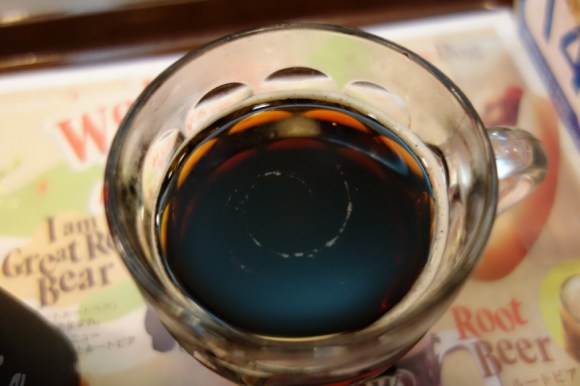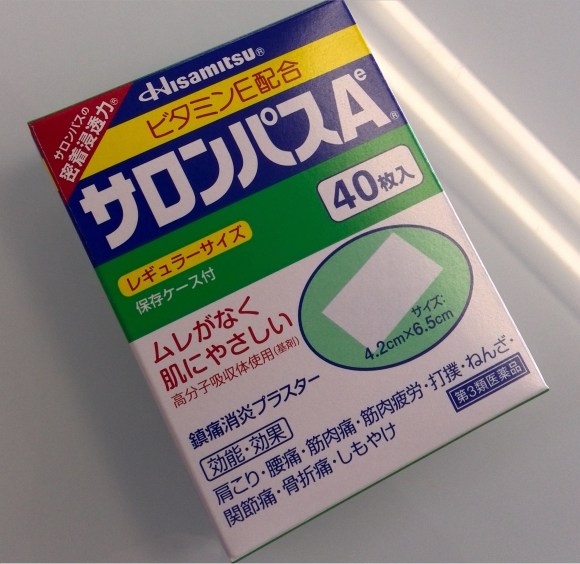
When living in another country it’s only natural to miss some of the tastes of home. In my case, the extreme rarity of root beer has been a source of sadness. Time to time I’ll come across a supermarket or import shop that carries it and am sure to pick up a can despite its often exorbitant price of around 200 yen (US$1.69).
The reason for the absence of the drink on the Japanese market is obvious though. Although root beer has its share of detractors even in its home of America, the sheer number of people who can’t stand the stuff in Japan is huge. What is it that makes root beer so overwhelmingly disgusting to Japanese people?
■ Okinawa: Land of root beer
Recently our reporter Nakano made the trip down to Okinawa to get a taste of the frothy brown soft drink for the first time. Okinawa was the one enclave of Japan where root beer could flourish thanks to the presence of American military installations there.
Nakano figured he’d do it right and went to an A&W restaurant for a fountain style glass of it. On researching root beer, he found that its reputation in Japan was that you’d either get completely disgusted by it or completely addicted to it on the first sip.
It turned out he was firmly in the completely disgusted camp and could barely finish his glass. He offered it to his travel companions who gave their opinions as “Aw, this is sh*t! F**k you!”
▼ Thank you! Come again!
■ Empirical Studies
In my many years living in Japan I have offered drinks of root beer (A&W mostly) to as many Japanese people as possible, well over a hundred. Although I haven’t recorded the reactions for a solid figure, I can say with confidence that about 90% of people who tasted it were immediately turned off.
Kids and teens tended to show a slight preference for it, but into adulthood there seems to be no correlation between age and a hatred of root beer. By far the most popular reason for disliking it is that “it tastes like medicine.” By a wide margin most people I’ve talked to compare it to the scent of a shippu which is a chemical hot or cold patch used for muscle aches and injuries. Nakano mentioned a popular comparison to a pain-relief patch by the name of Salonpas “with just a hint of sugar mixed in.”
■ Off to the drug store
I could understand the comparison to medicine in the sense that root beer does use various roots (hence the name) that might be used in medicines such as licorice. There are also hints of mint and wintergreen but hardly enough to remind me of medicine. Furthermore, I’ve never encountered any medicine that even remotely reminded me of root beer. At best some cough syrups have that sickly attempt at a cherry flavor that some associate with a Dr. Pepper (also fairly hated in Japan), but nothing like an A&W.
So I went down to the local drug store and picked up a pack of Salonpas that Nakano mentioned for a smell test. Sure enough right upon opening up the sealed plastic back I was hit with a whiff that smelled just like root beer with slightly more mint to it. I actually found myself taking deeper and deeper sniffs attracted to the sweet flavor but then realized that inhaling a medicinal patch probably wasn’t good for the old brain cells and stopped.
Suddenly it all added up. People in Japan would likely associate the smell of root beer to the inedible pain-relieving patch and perhaps even on a deeper level to the painful situation that came along with it for an extra kick of negativity. On the other hand, I found Salonpas pads to have an utterly delightful smell and would recommend them for anyone who loves root beer and has stiff shoulders. It also kind of explained why kids didn’t mind the taste as much since they were less likely to use Salonpas.
■ Different floats for different folks
There are likely other factors at play in the widespread dislike of root beer in Japan. Perhaps its flavor doesn’t mesh well with the standard cultural tastes of the land, but in a country that embraces natto, fermented beans which smell like a turd wrapped in a sweaty sock, that seems unlikely.
There’s also a chance of a genetic factor in Japanese people’s sense of taste which makes something in root beer stand out as particularly unpleasant. However, judging by people’s overwhelmingly popular comparisons to medicine it would seem that is the culprit here.
This leaves the question of why Salonpas smells like root beer. The ingredients listed on the box say that it has “added scents” suggesting that the fragrance was chosen deliberately by the makers. Regardless of whether this scent was designed to be like root beer or merely a coincidence, it seems to have really put the kybosh on the drink’s popularity in the entire country.
UPDATE: As Kim Pennebaker pointed out in the comments, it appears that wintergreen oil (methyl salicylate) is the common scent between Salonpas and root beer rather than any added scent. Methyl Salicylate is the active ingredient in highest content in Salonpas and tends to have a pungent scent. It’s used in other medicines and foods as well, but in the case of Salonpas and root beer it appears to be all in the amounts.
Photos: RocketNews24
Read Nakano’s full report in Japanese on RocketNews24
[ Read in Japanese ]




 Japanese people reveal the six western foods they find most disgusting
Japanese people reveal the six western foods they find most disgusting Yokohama Beer Fes 2014 serves up Japanese craft beer from around the country【Photos】
Yokohama Beer Fes 2014 serves up Japanese craft beer from around the country【Photos】 Sapporo Breweries reveals Ginza Brown — the only beer in the world made from honey bee yeast!
Sapporo Breweries reveals Ginza Brown — the only beer in the world made from honey bee yeast! Move over pumpkin, it’s time for some frothy apple cinnamon goodness … in a bottle!
Move over pumpkin, it’s time for some frothy apple cinnamon goodness … in a bottle! Clear near beer is here! We taste test Japan’s new zero-alcohol, zero-color brew【Taste test】
Clear near beer is here! We taste test Japan’s new zero-alcohol, zero-color brew【Taste test】 Japanese city loses residents’ personal data, which was on paper being transported on a windy day
Japanese city loses residents’ personal data, which was on paper being transported on a windy day Foreigner’s request for help in Tokyo makes us sad for the state of society
Foreigner’s request for help in Tokyo makes us sad for the state of society Should you add tartar sauce to Japanese curry rice? CoCo Ichi makes diners an unusual offer
Should you add tartar sauce to Japanese curry rice? CoCo Ichi makes diners an unusual offer Seaside scenery, history, and so many desserts on Yokohama’s Akai Kutsu【Japan Loop Buses】
Seaside scenery, history, and so many desserts on Yokohama’s Akai Kutsu【Japan Loop Buses】 Japan’s cooling body wipe sheets want to help you beat the heat, but which work and which don’t?
Japan’s cooling body wipe sheets want to help you beat the heat, but which work and which don’t? Smash Bros. director Sakurai stabs Kirby in the face, has delicious justification for it
Smash Bros. director Sakurai stabs Kirby in the face, has delicious justification for it Tokyo capsule hotel’s low month-long rates are an awesome way to sample life in Japan’s capital
Tokyo capsule hotel’s low month-long rates are an awesome way to sample life in Japan’s capital With an Evangelion watch on your wrist, “all is right with the world.”
With an Evangelion watch on your wrist, “all is right with the world.” Akiba Dental Clinic: The Akihabara dentist where a moe maid in cosplay cleans your teeth
Akiba Dental Clinic: The Akihabara dentist where a moe maid in cosplay cleans your teeth A Gintama fan’s emotional 19-year journey to buy a proper Lake Toya bokuto wooden katana【Pics】
A Gintama fan’s emotional 19-year journey to buy a proper Lake Toya bokuto wooden katana【Pics】 McDonald’s new Happy Meals offer up cute and practical Sanrio lifestyle goods
McDonald’s new Happy Meals offer up cute and practical Sanrio lifestyle goods Japanese ramen restaurants under pressure from new yen banknotes
Japanese ramen restaurants under pressure from new yen banknotes French Fries Bread in Tokyo’s Shibuya becomes a hit on social media
French Fries Bread in Tokyo’s Shibuya becomes a hit on social media Studio Ghibli releases new action figures featuring Nausicaä of the Valley of the Wind characters
Studio Ghibli releases new action figures featuring Nausicaä of the Valley of the Wind characters New private rooms on Tokaido Shinkansen change the way we travel from Tokyo to Kyoto
New private rooms on Tokaido Shinkansen change the way we travel from Tokyo to Kyoto Red light district sushi restaurant in Tokyo shows us just how wrong we were about it
Red light district sushi restaurant in Tokyo shows us just how wrong we were about it Tokyo Tsukiji fish market site to be redeveloped with 50,000-seat stadium, hotel, shopping center
Tokyo Tsukiji fish market site to be redeveloped with 50,000-seat stadium, hotel, shopping center All-you-can-drink Starbucks and amazing views part of Tokyo’s new 170 meter-high sky lounge
All-you-can-drink Starbucks and amazing views part of Tokyo’s new 170 meter-high sky lounge Beautiful Ghibli sealing wax kits let you create accessories and elegant letter decorations【Pics】
Beautiful Ghibli sealing wax kits let you create accessories and elegant letter decorations【Pics】 Studio Ghibli releases Kiki’s Delivery Service chocolate cake pouches in Japan
Studio Ghibli releases Kiki’s Delivery Service chocolate cake pouches in Japan New definition of “Japanese whiskey” goes into effect to prevent fakes from fooling overseas buyers
New definition of “Japanese whiskey” goes into effect to prevent fakes from fooling overseas buyers Our Japanese reporter visits Costco in the U.S., finds super American and very Japanese things
Our Japanese reporter visits Costco in the U.S., finds super American and very Japanese things Studio Ghibli unveils Mother’s Day gift set that captures the love in My Neighbour Totoro
Studio Ghibli unveils Mother’s Day gift set that captures the love in My Neighbour Totoro More foreign tourists than ever before in history visited Japan last month
More foreign tourists than ever before in history visited Japan last month New Pokémon cakes let you eat your way through Pikachu and all the Eevee evolutions
New Pokémon cakes let you eat your way through Pikachu and all the Eevee evolutions Sales of Japan’s most convenient train ticket/shopping payment cards suspended indefinitely
Sales of Japan’s most convenient train ticket/shopping payment cards suspended indefinitely Sold-out Studio Ghibli desktop humidifiers are back so Totoro can help you through the dry season
Sold-out Studio Ghibli desktop humidifiers are back so Totoro can help you through the dry season Japanese government to make first change to romanization spelling rules since the 1950s
Japanese government to make first change to romanization spelling rules since the 1950s Ghibli founders Toshio Suzuki and Hayao Miyazaki contribute to Japanese whisky Totoro label design
Ghibli founders Toshio Suzuki and Hayao Miyazaki contribute to Japanese whisky Totoro label design Doraemon found buried at sea as scene from 1993 anime becomes real life【Photos】
Doraemon found buried at sea as scene from 1993 anime becomes real life【Photos】 Tokyo’s most famous Starbucks is closed
Tokyo’s most famous Starbucks is closed One Piece characters’ nationalities revealed, but fans have mixed opinions
One Piece characters’ nationalities revealed, but fans have mixed opinions We asked a Uniqlo employee what four things we should buy and their suggestions didn’t disappoint
We asked a Uniqlo employee what four things we should buy and their suggestions didn’t disappoint Princesses, fruits, and blacksmiths: Study reveals the 30 most unusual family names in Japan
Princesses, fruits, and blacksmiths: Study reveals the 30 most unusual family names in Japan Do Japanese people like Dr. Pepper? Online poll seeks the truth, gets 28,000 responses
Do Japanese people like Dr. Pepper? Online poll seeks the truth, gets 28,000 responses We investigate the half-priced beer at Sushiro that everyone is angry about
We investigate the half-priced beer at Sushiro that everyone is angry about Can you tell the difference between real beer and Japan’s happoshu quasi-beer?【Taste test】
Can you tell the difference between real beer and Japan’s happoshu quasi-beer?【Taste test】 Akashi Brewery is now offering “Moe Beer” for your thirst-quenching, otaku needs
Akashi Brewery is now offering “Moe Beer” for your thirst-quenching, otaku needs Hakone Beer will celebrate 20th anniversary, give away 1,500 beers at special Tokyo event
Hakone Beer will celebrate 20th anniversary, give away 1,500 beers at special Tokyo event Asahi Super Dry to sell draft beer in a can
Asahi Super Dry to sell draft beer in a can Our Japanese reporter visits Czechia’s famous beer spas and boozily bathes in a bath of beer
Our Japanese reporter visits Czechia’s famous beer spas and boozily bathes in a bath of beer Yogurt-flavored water?!? We try Suntory’s new beverage straight, mix it with booze 【Taste test】
Yogurt-flavored water?!? We try Suntory’s new beverage straight, mix it with booze 【Taste test】 Japanese people most like to drink green tea with their chips, incredibly dull survey finds
Japanese people most like to drink green tea with their chips, incredibly dull survey finds We try “The Dream,” Asahi’s new, purportedly “perfect” beer【Taste Test】
We try “The Dream,” Asahi’s new, purportedly “perfect” beer【Taste Test】 Asahi Brewery asks: Why not mix beer and Calpis? So we do…
Asahi Brewery asks: Why not mix beer and Calpis? So we do… Japanese beer giant Asahi buys British London Pride brewery; U.K. writer hopping mad
Japanese beer giant Asahi buys British London Pride brewery; U.K. writer hopping mad Mountain Dew opening the Mountain De Yu public bath house in Tokyo for Mountain Day
Mountain Dew opening the Mountain De Yu public bath house in Tokyo for Mountain Day Seven Japanese beauty products recommended by Twitter that are perfect for lazy girls
Seven Japanese beauty products recommended by Twitter that are perfect for lazy girls Tabasco Japan says you should add hot sauce to your beer, but are they right?【Taste test】
Tabasco Japan says you should add hot sauce to your beer, but are they right?【Taste test】 Melon Dr. Pepper appears in Japan, but is it just what the doctor ordered?【Taste test】
Melon Dr. Pepper appears in Japan, but is it just what the doctor ordered?【Taste test】
Leave a Reply